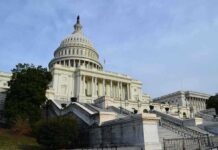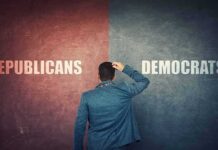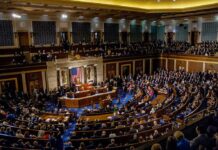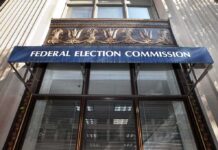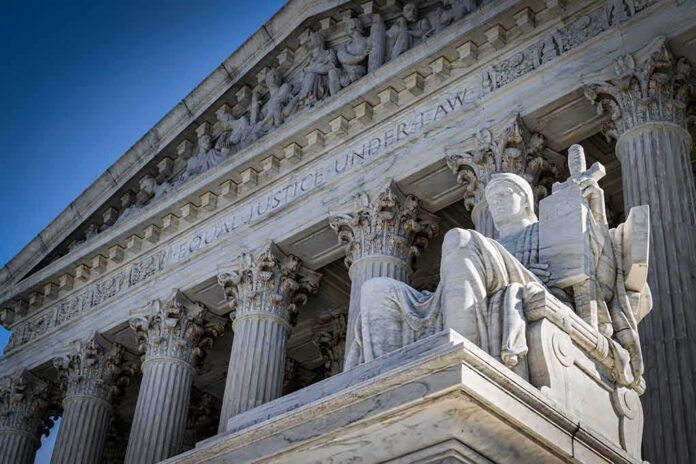
The Supreme Court declined to hear a challenge to California’s ban on gun shows at state property, leaving in place restrictions that Second Amendment advocates say clearly violate constitutional protections.
Key Insights
- The Supreme Court’s refusal to consider B&L Productions v. Gavin Newsom effectively upholds California’s ban on gun shows on state-owned property.
- This decision follows a 9th U.S. Circuit Court of Appeals ruling that previously affirmed the state’s restriction.
- The court’s inaction stands in contrast to Justice Clarence Thomas’s 2022 opinion strongly defending Second Amendment rights.
- Critics view this as further evidence of federal judiciary reluctance to protect constitutional freedoms from government overreach.
Supreme Court’s Decision Creates Second Amendment Controversy
The U.S. Supreme Court has declined to hear a challenge to California’s ban on gun shows on state property, a decision that has significant implications for Second Amendment interpretations across the country. The case, B&L Productions v. Gavin Newsom, was previously upheld by the 9th U.S. Circuit Court of Appeals, and the Supreme Court’s refusal to review the matter lets that ruling stand. This development allows California to continue restricting lawful commerce in firearms on state-owned land, despite vigorous objections from gun rights advocates.
Oh shocker. No Snope or Ocean State on the SCOTUS Orders LIst (again). But the B&L Productions case from California was denied. So,we play on. pic.twitter.com/qdvKKDtpVb
— WashingtonGunLaw (@GunWashington) April 28, 2025
The decision has drawn criticism from Second Amendment supporters who point to the explicit language in the Constitution stating the right to keep and bear arms “shall not be infringed.” Many see this as a troubling departure from Justice Clarence Thomas’s strong defense of gun rights in a landmark 2022 ruling. The Court’s refusal to engage with the California gun show ban case has reignited debate about the proper role of government in regulating firearms sales and ownership.
Judicial Restraint or Constitutional Abdication?
Critics of the Court’s decision have focused particular attention on Chief Justice John Roberts and Justice Amy Coney Barrett, suggesting they have failed to demonstrate consistent support for constitutional freedoms. The inaction by the Court is viewed by many conservatives as allowing California to sidestep the high standard of justification that should be required when limiting fundamental rights. This has prompted renewed discussion about the nature of the Bill of Rights as a limit on government power rather than a grant of rights from government to citizens.
“For months, high-ranking Government officials placed unrelenting pressure on Facebook to suppress Americans’ free speech. Because the Court unjustifiably refuses to address this serious threat to the First Amendment, I respectfully dissent,” expressed Justice Alito.
While Justice Alito’s statement refers to a different case involving free speech, many Second Amendment advocates see parallels in the Court’s reluctance to address government restrictions on constitutional rights. The tension between state regulatory authority and individual liberties protected by the Constitution continues to be a flashpoint in American jurisprudence, with the California gun show case representing the latest chapter in this ongoing legal conflict.
Broader Implications for Constitutional Freedoms
The Supreme Court’s decision not to hear the California gun show ban challenge raises significant questions about how constitutional freedoms will be interpreted and protected going forward. Gun rights advocates argue that restrictions like California’s do little to deter those with malicious intent while substantially burdening law-abiding citizens exercising their constitutional rights. They contend that effective public safety could be better achieved through alternative methods that don’t restrict constitutional freedoms.
The Court’s refusal to engage with this case may embolden other states to pursue similar restrictions on Second Amendment activities. Constitutional scholars note that the foundational principle that government power must be limited to protect individual rights appears to be receiving inconsistent application from the current Court. As California’s ban remains in effect, gun rights organizations are likely to continue seeking other legal avenues to challenge what they view as unconstitutional infringements on Second Amendment protections.
The silence from the Supreme Court on this matter leaves unresolved questions about the extent to which state governments can restrict gun-related activities on public property. For now, California’s approach stands, but the broader constitutional debate continues with renewed intensity as advocates for Second Amendment rights consider their next steps in defending against what they view as government overreach.
Sources:
SCOTUS Betrays Again – This Time Sides with California Against Gun Owners
Supreme Court won’t hear challenge to California ban on gun shows on public land


 News Editor
News Editor

